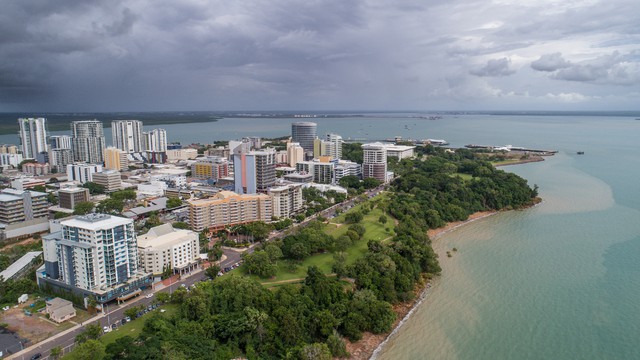What’s the climate like in Bundaberg?
The current climate of Bundaberg features average monthly temperatures ranging from highs of 31°C during the day to lows of 23°C. The average yearly temperature is around 28°C. At night, temperatures in the colder months average around 10°C and in the warmer months around 22°C.
The highest temperature recorded in Bundaberg in recent years was 41°C in January 2014. The lowest daytime temperature recorded was 12°C in July 2022.
On average, Bundaberg receives 1020 mm of precipitation each year. For comparison, London gets 701 mm of precipitation annually.
Curious about the climate in other parts of Australia? Check out the weather and climate in places like Sydney, Gold Coast, Melbourne, or have a look at other destinations in Australia.
Best time to visit Bundaberg?
The best time to visit Bundaberg for sunny weather is March through September and November. During this period, you'll have good temperatures and not too much rain, making it a great time to visit Bundaberg. In the other months of the year, there's too much rain or the temperature isn't ideal for a visit if you want sunny and pleasant weather.
Climate Table of Bundaberg
The climate table of Bundaberg shows the average temperatures, precipitation, and UV index per month. The table gives an overview of the average day and night temperatures in degrees Celsius, the total amount of precipitation in millimetres, the total snowfall in centimetres, and the UV index for each month. Precipitation is always measured as water, even if it's snow or hail.
| Jan | Feb | Mar | Apr | May | Jun | Jul | Aug | Sep | Oct | Nov | Dec | |
|---|---|---|---|---|---|---|---|---|---|---|---|---|
| Temp. max (°C) | 31 | 31 | 30 | 28 | 25 | 23 | 23 | 24 | 26 | 28 | 30 | 30 |
| Temp. min (°C) | 22 | 22 | 22 | 18 | 15 | 13 | 11 | 12 | 15 | 17 | 19 | 21 |
| Precipitation | ||||||||||||
| Precipitation (mm) | 130 | 138 | 116 | 51 | 56 | 29 | 34 | 21 | 37 | 156 | 110 | 142 |
| UV Index | 9 | 9 | 8 | 8 | 7 | 7 | 7 | 8 | 8 | 9 | 9 | 9 |
Click on the month name to see more weather details, like daily averages, temperatures, and precipitation for the past years in that month.
- Average yearly temperature: 28°C
- Highest temperature: 31°C in January and February
- Lowest temperature: 23°C in June and July
- Precipitation: 1020 mm per year, averaging 85 mm per month
- Driest months: 21 mm in August, 29 mm in June and 34 mm in July
- Wettest months: 156 mm in October, 142 mm in December and 138 mm in February
Table of Contents
Average Temperature per Month in Bundaberg
This graph shows the average maximum temperatures per month in Bundaberg, Australia. The temperatures are shown in degrees Celsius and the average is calculated based on the recorded temperatures per month from past years.
Average Precipitation per Month in Bundaberg
This graph shows how much precipitation Bundaberg, Australia, gets on average per month. Precipitation is always measured as water, even if it's snow or hail. This makes it easy to compare how much has fallen, regardless of the form of precipitation. The amount of precipitation is measured in millimetres and the average is calculated based on the recorded precipitation per month from past years.
Average UV Index per Month in Bundaberg
This graph shows the average UV index per month in Bundaberg, Australia. The UV index indicates the intensity of ultraviolet radiation and ranges from 0 to a maximum of 11.
Yearly Temperature in Bundaberg
This graph shows the average yearly temperature in Bundaberg, Australia. The yearly temperature, expressed in degrees Celsius, is the average of all twelve monthly temperatures summed up for that year.
Total Yearly Precipitation in Bundaberg
This chart shows the total yearly precipitation in Bundaberg, Australia, over the past few years. The total yearly precipitation, measured in millimetres, is the sum of all the rain that fell in the twelve months of that year.
Weather experiences in Bundaberg
Have you been to Bundaberg?
Share your weather experiences in Bundaberg.
Average Weather in Bundaberg by Month
Click on a month below to see detailed weather info for Bundaberg. Based on historical weather data, you can see the average temperature, precipitation, wind, and UV index for each day of the month.
Popular destinations in Australia
Discover the climate of these popular destinations in Australia.












